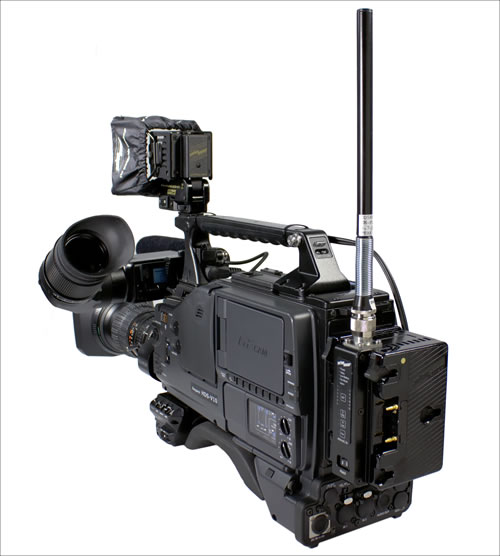Cameras: News and Updates
| Anton/Bauer's New AB-HDRF System Makes IBC 2012 Debut By StudentFilmmakers.com posted Sep 7, 2012, 11:20 |
AB-HDRF System Offers Portable RF Solution
(AMSTERDAM) Anton/Bauer®, part of Vitec Videocom, a Vitec Group company, and global provider of batteries, chargers, lighting and other mobile power systems for the professional broadcast, video and film industries, will be showcasing its new AB-HDRF System at IBC 2012 (Hall 11, Stand E55). This compact 5.8 GHz COFDM RF system can transmit a robust HD signal over great distances; all while being powered by Anton/Bauer batteries.
A collaboration between Anton/Bauer and Vitec Group sister company Integrated Microwave Technologies, LLC (IMT), Anton/Bauer's AB-HDRF System is a COFDM transmitter that utilizes the 5.8 GHz frequency band. The AB-HDTX sends its signal directly to the AB-HDRX dual-diversity receiver or the DirectVu handheld confidence monitor/receiver. The unit's size makes it ideal for reality-based, ENG/EFP and live event coverage.
"We are thrilled to debut this new system to the IBC community," says Shin Minowa, vice president of marketing and business development, Anton/Bauer. "The response has been overwhelmingly positive thus far and we believe professionals love this system because it is compact, fits on the end of their camera and can be powered with their existing Anton/Bauer batteries, without adding much extra weight. We are proud to continue to offer solutions to help power our clients' creativity, while protecting their investment." As the system only draws about 15 watts, Anton/Bauer batteries, including the DIONIC® 90, HC and HCX, can be used with it to offer reliable power for extended periods of time.
The AB-HDRF System has an RF output of 100 mW and is capable of accepting a wide range of HD/SD video formats along with embedded audio from the HD-SDI output on the camera. The use of MPEG-4 compression allows the signal to travel a half-mile in line-of-site applications. The system offers users the flexibility to choose between 12 different channels in which to transmit, ensuring the least amount of interference. "This also allows multiple cameras to transmit to one central receive site," adds Minowa. "In this application, a director can conveniently monitor different shots and make adjustments in real time."
Resources:
